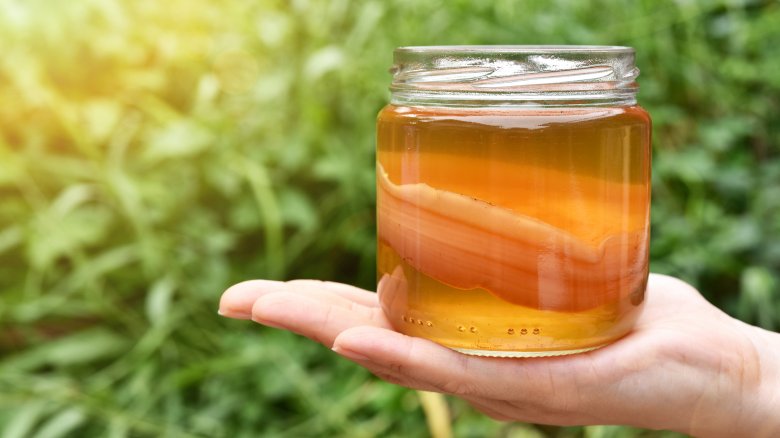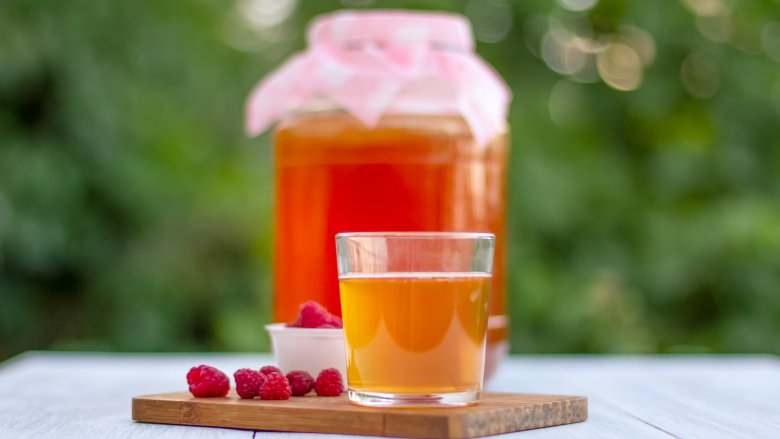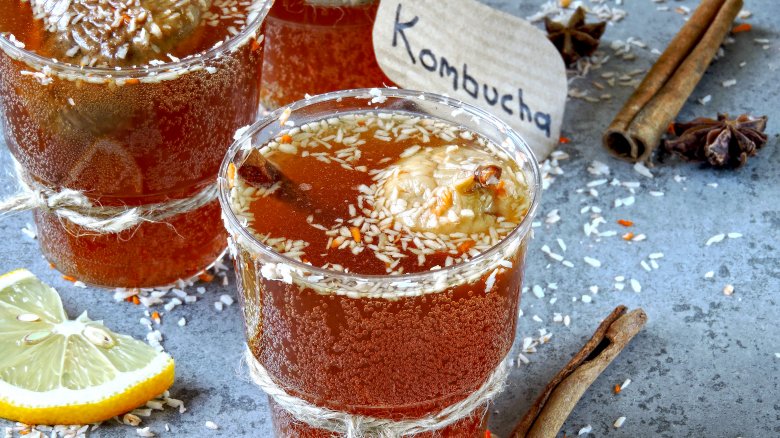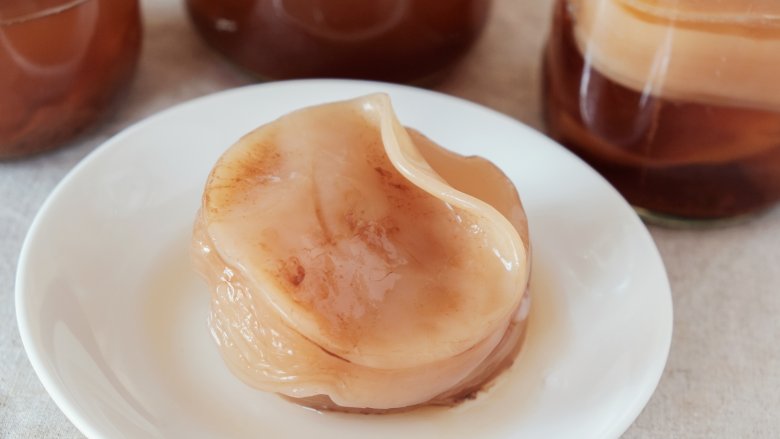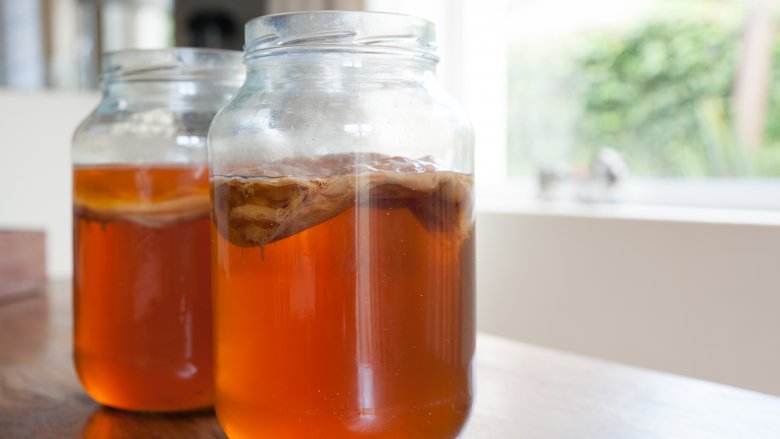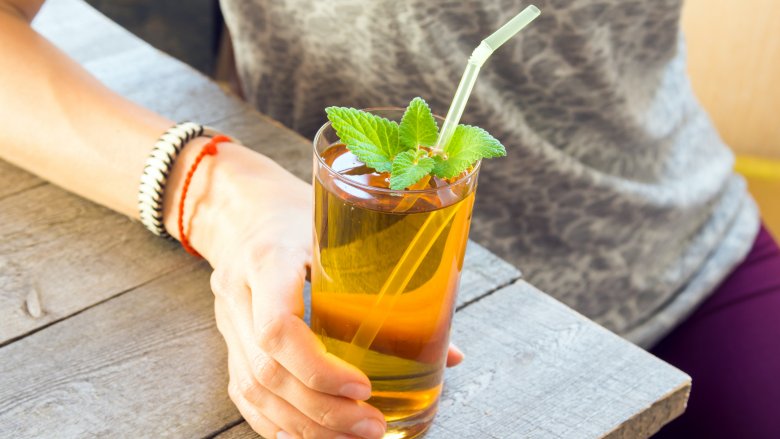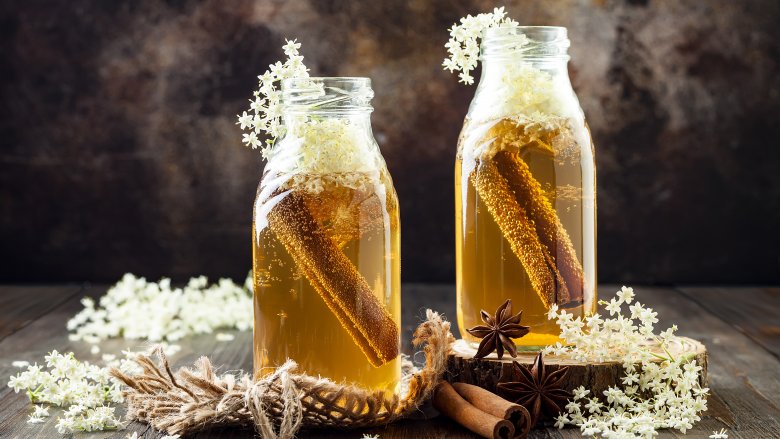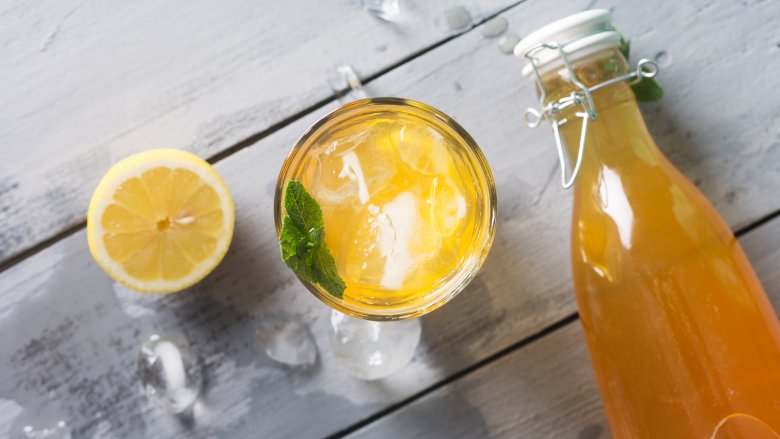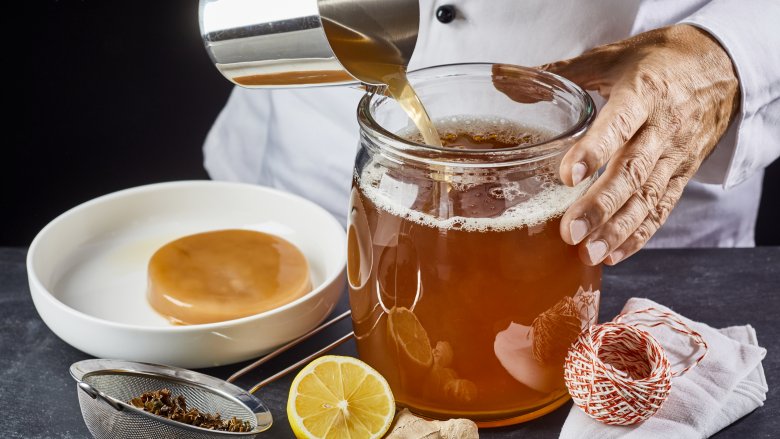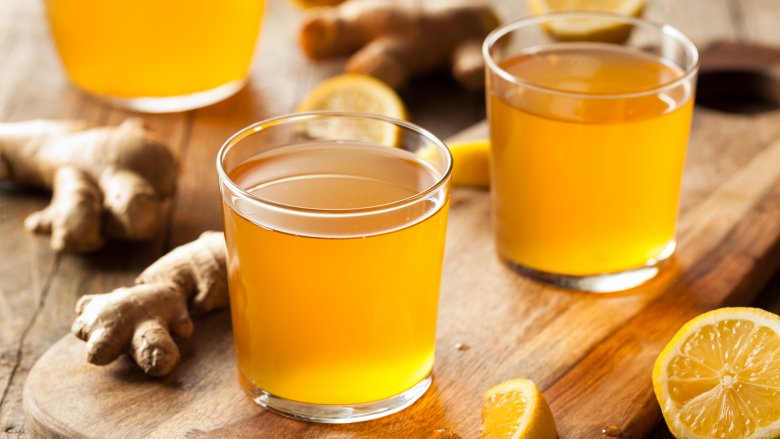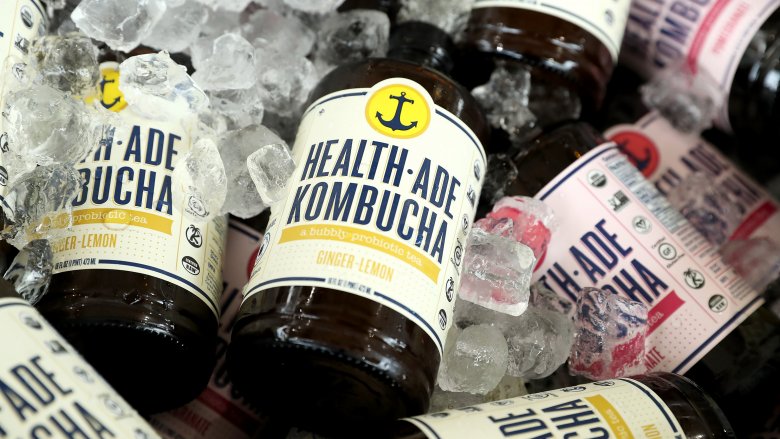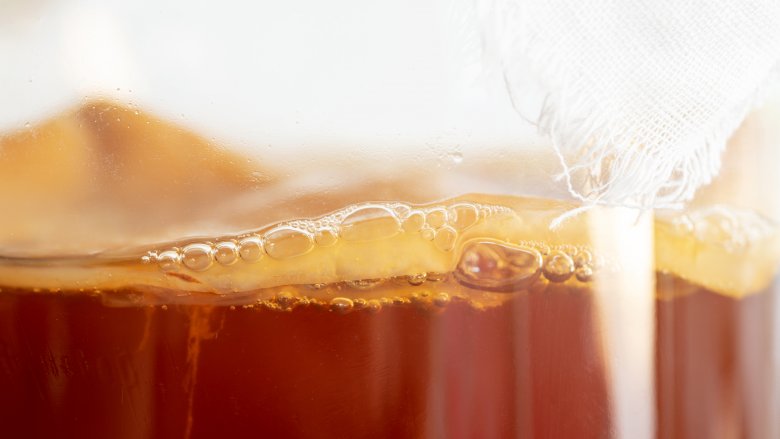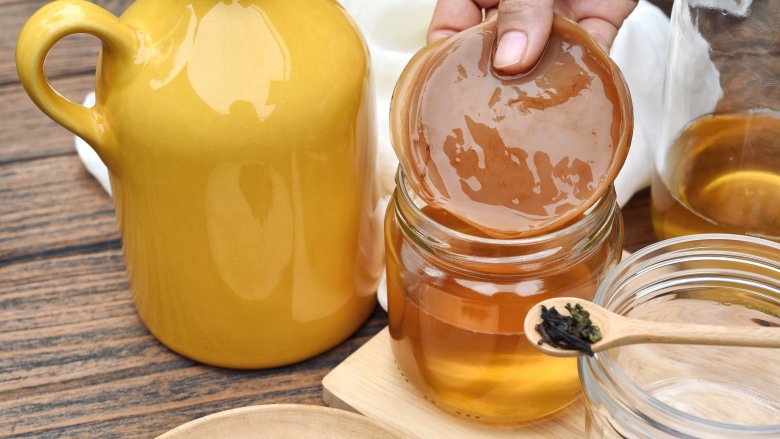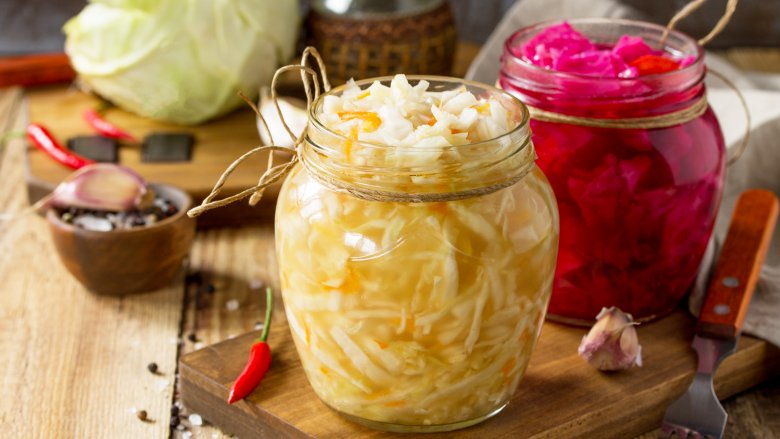What You Need To Know Before You Drink Kombucha
Back before 2005, not that many people in the U.S. had heard of kombucha. But by 2014, it had become a $400-million-a-year industry, with kombucha mogul G.T. Dave driving most of the sales. According to Quartz, Dave is the one responsible for the high-profile rise of the drink, taking it from something mystical and turning it into something mainstream.
Dave began brewing his kombucha after his mother's battle with breast cancer, which they say she won with help from the ancient drink. It was 1996, Inc. says, when Dave started brewing on a large scale, at the same time his family was dealt another tragic blow: the death of his brother, from a rare form of cancer. By 1999, Whole Foods was knocking on his door, and the rest was foodie history. Since then, others have waded into the kombucha market, with even giants like Coca-Cola releasing their own versions of this age-old tonic. It's the trendy thing to do, pick up a bottle of kombucha, but there are some things you should know before you follow the example of celebs like Gwyneth Paltrow and Reese Witherspoon and partake in this mystic drink.
What are the benefits of drinking kombucha?
There are a ton of reported health benefits that come from drinking kombucha: Inc. says the industry was built on the shoulders of such claims. But what does science have to say about it?
According to Healthline, there are some health claims that are backed up by scientific research... although many come with caveats, like the idea that kombucha will help maintain a healthy balance of bacteria in the gut. While kombucha does contain bacteria like the strains that are necessary for digestive health, maintaining a healthy weight, and managing inflammation, they say that direct evidence the drink actually does anything helpful is lacking.
They also say that it's highly likely kombucha will give you many of the same benefits as green tea: a reduced risk of cancer, improved cholesterol levels, and blood sugar control. Kombucha is high in antioxidants, which might help those suffering from liver disease. But again, human studies are lacking. We know kombucha has antibacterial properties, but what good that does us is still unclear. The bottom line is that any of the health benefits backed by at least a bit of science are among the same benefits you'll get from drinking green tea, and they are out there.
A lot of the claims about kombucha aren't backed up by science
Here's the bad news for devotees of the kombucha craze: many of the claims circulating about it aren't based in fact. Microbiologist and assistant professor Heather Hallen-Adams from the University of Nebraska-Lincoln puts it this way (via Vice): "There are people out there telling you — it'll cure cancer, it'll cure diabetes, it'll cure cardiac illness, it'll build your immune system, it'll prevent herpes, it'll reverse AIDS. It might have some placebo effect, but anything that can cure everything basically doesn't cure anything."
Some researchers — like Dr. Zhaoping Li, a professor of medicine from the University of California, Los Angeles — doubts kombucha even does much for our gut health. She says that kombucha only has a relative handful of strains of good bacteria, while there are 300 trillion that make up our gut flora. Does that make the least bit of difference? Especially considering, she says, there's no way of knowing exactly what bacteria are thriving — or dying — in the colony your commercial kombucha came from.
Others agree. The Mayo Clinic's Brent A. Bauer, MD, cites a lack of scientific studies, limited evidence, and the potential for the brewing process to go terribly wrong as reasons you should think carefully before cracking open your next kombucha.
SCOBY is an important part of kombucha
One of the first things you might hear about when people start talking kombucha is the SCOBY. It's the thing that makes kombucha possible, and it stands for "symbiotic culture of bacteria and yeast"... and it looks as gross as it sounds. According to Healthline, a healthy SCOBY is supposed to smell like vinegar (not cheesy or moldy, signs it's gone bad), and it's mostly made from cellulose. Plop a healthy SCOBY into sweetened tea, and it'll kick off a fermentation process where the bacteria and yeast in the SCOBY changes the sugars in the tea into acids, carbon dioxide, and alcohol.
A SCOBY can come from all different places: health food stores sell them, or you can make one by letting a bottle of kombucha ferment in the warmth for around a month. Since it keeps growing bigger the more kombucha you make, you can cut pieces off a SCOBY and grow a new one.
And they're super weird. In 2015, Vice reported that the European Space Agency was going to start sticking slabs of SCOBY onto the side of the International Space Station to see how well it could survive, unprotected, in space. Why? Because a SCOBY is so resilient to environmental challenges that it would likely survive in space, and absorb any space bacteria that happened to be floating by. Scientists could then check it out — and maybe even find signs of extraterrestrial life.
Here's how kombucha is made
Kombucha is a fermented beverage that is essentially made from a base of either green or black tea. Different companies and brewers differ in the details, but basically, once the SCOBY is introduced into the tea, it ferments for somewhere between one and three weeks. Then, it's bottled and left to sit for another one or two weeks, and here, says Forbes, is the important part. After it's been carbonated, it's moved into refrigerated storage to slow a fermentation process that would otherwise just keep going.
And that's where the problems started. Back in ye olden days of 2010 — when kombucha was still fairly new to the mass market shelves — a Consumer Protection Inspector for the Maine Department of Agriculture found some leaking bottles on shelves at Whole Foods. Testing showed that alcohol levels were wildly inconsistent and products were pulled from shelves. What happened? New regulations were put in place to oversee kombucha, and the Kombucha Brewers International was founded to help educate both brewers and consumers about the processes that happen in a brewing batch of kombucha — including the care that needs to be taken to stop the second fermentation process from increasing the alcohol content too much.
Kombucha could have a ton of sugar
Many people who drink kombucha drink it because of the health benefits — real or hyped — that go along with it, but if you're hoping it's going to help you get healthier, you need to be aware of one massive potential pitfall: it could be packed with a ton of sugar.
It was only when she did some close label-reading and some math that Carolyn Brown, RDN, realized (via Shape) that her regular bottle of kombucha came with a whopping 20 grams of sugar. Considering the American Heart Association recommends women limit their sugar intake to 25 grams per day (and men to 36 grams per day), that's a lot.
She did some investigating, and found that figuring out the sugar content of kombucha is tricky. FDA regulations say a product has to be labeled with the amount of sugar used, not the amount left when fermentation was complete. That makes it sound like it should have less sugar than what's on the label, but she then found out that studies have shown some brands contain as much as 300 percent more sugar than they say. She adds that while it's difficult to tell just how much sugar you're getting, your best bet is to look for the labels that advertise no added sugar... because that's really the best you can do until labels and kombucha nutritional information are both standardized and enforced.
Yes, kombucha does contain alcohol
When you think of fermentation, you probably think of the process that makes alcohol. And yes: according to Heathline, alcohol is one of the compounds that's made when a SCOBY ferments in tea. But does that alcohol make it into your morning drink?
It can, and they say that even though commercial kombuchas are generally labeled as "non-alcoholic," they can contain anywhere up to .5 percent alcohol. Homebrewed kombuchas are a different matter entirely, and they can have an alcohol content of 3 percent or above. (For a comparison, that's about the same percentage as a bottle of Amstel Light or a Yuengling Light.)
But back to that .5 percent. It can be a huge problem, a spokesperson for Alcoholic Anonymous told Vice. "People are very susceptible to the power of suggestion. If it's suggested that there is alcohol in this beverage, and they drink it and they're OK, then they could drink something else and be OK, and that can be really dangerous." They even described it as a "gateway" for some people. For all those reported benefits, it could be tragic for some.
Some people shouldn't drink kombucha
While experts might not agree on just how good kombucha can be, one thing they do seem to agree on is that there are people who just shouldn't drink it. And the reasons are terrifying.
Dr. Zhaoping Li of UCLA says (via Time) that women who are pregnant or breastfeeding, or those who are living with a condition that gives them a compromised immune system, should stay away. "... those live bacteria can get into your blood, causing disease," she says. "It's almost the same as when we tell a pregnant woman and immunocompromised patient don't eat raw fish. That's the same concern."
According to Healthline, the problem with kombucha stems from its bacterial content and the fact that it's unpasteurized. They give more specifics on just who might get incredibly ill from drinking it: anyone who has been diagnosed with kidney disease, HIV, or cancer, as well as anyone susceptible to infection.
And according to what Alcoholics Anonymous told Vice, they recommend that recovering alcoholics should also stay away from it because of the trace — and often unpredictable — amount of alcohol.
There are side effects if you drink too much kombucha
Thinking about raising your kombucha intake? You should be careful, because according to Healthline, there are some very real consequences to drinking too much.
For starters, a bottle of kombucha can have as much as 120 calories per bottle, and since it's not going to fill you up like 120 calories of food, adding it to your daily diet can lead to a major increase in your calorie consumption. Also, kombucha's carbonation can cause some to experience uncomfortable bloating, and it also contains a type of carbohydrate that can lead to gastrointestinal distress, especially in those with IBS.
If you decide to save your daily kombucha for unwinding at night after a long day, there's potential problems here, too. While it contains less caffeine than a cup of tea, those sensitive to it might find their nightly routine disrupted by the jitters or anxiety. Lisa Moskovitz, RD, adds (via Women's Health) that too much kombucha can also lead to heartburn, and no one wants that in their day if they can help it. And don't forget, kombucha is pretty acidic, and that's led dentists to warn (via Time) that drinking too much of it is likely to have the same corrosive effects on your teeth as drinking too much soda.
Don't go all-in right away with kombucha
So, you think you're ready to try kombucha? First, a bit of a warning from Denver-based dietitian Maria Zamarripa (via Time): "Some people may not tolerate large amounts of kombucha right away. Start by drinking 4 ounces or less per day, and increase the volume based on your tolerance."
Dr. Elizabeth Boham, MD, agrees, telling Well+Good that chugging a bottle of kombucha on the first try is likely to cause you more gastrointestinal distress and bloating than anything else, as it's a lot of something very new and very different for your body to try to deal with. She recommends that anyone trying it for the first time limit themselves to just a few small sips and build from there, and it's not just newcomers to the kombucha experience that need to be careful. She recommends no one drink any more than 50 calories' worth of kombucha per day, and cautions that drinking it all at once might not be a great idea. That's because the sugars in kombucha are absorbed into the body very quickly, and not taking it slow could result in a major spike in insulin.
It's entirely possible someone might experience even more dire consequences: Maxine Smith, RD, LD told the Cleveland Clinic that drinking too much could lead to lead toxicity (depending on the vessel it was fermented in) and ketoacidosis, a medical emergency caused by the presence of too much acid in the bloodstream.
A bottle is usually more than a single recommended serving of kombucha
If you pick up a bottle of something, whether it be sparkling water, soda, or kombucha, what do you usually do when you open it? Do you finish the whole thing, especially if it's only around 16 ounces? If you do, you're certainly not alone... and that's where kombucha gets tricky.
When Maxine Smith, RD, LD talked to the Cleveland Clinic about the safety of kombucha, she cited guidelines from the Centers for Disease Control that suggested limiting your kombucha intake to no more than 12 ounces per day. The problem? Many bottles of commercially prepared kombucha are 16 ounces, like GT's Synergy. That means if you're drinking the whole thing, you're drinking more than medical experts recommend. Also, if you're checking labels for things like sugar content, it's important to be aware that a serving size and the entire container probably aren't the same thing. Be aware!
Homemade kombucha can be incredibly dangerous
So, you can definitely make your own kombucha. A lot of people do, as it often comes with a price tag that reflects its trendiness. But there's some serious dangers you should be aware of it you're thinking about making the jump into home-brew kombucha; according to How Stuff Works, there's a lot that can go wrong.
It turns out that it's incredibly easy for batches of home brew kombucha to become contaminated by mold, because as diligent as you are about cleaning, your kitchen isn't the same kind of sterile environment a commercial kombucha facility is. When fermentation starts happening with these intruders in the mix, the outcome can be downright deadly. Amanda Medress found that out (via Salon) when she came down with food poisoning she linked to her home brew. That's when she realized the FDA had warned of the risks of serious illnesses and even death.
Take two cases that happened in 1995. Two women who brewed kombucha from the same mother culture both went into cardiac arrest, leading to the death of one. No one is entirely sure what happened, but it's theorized that there was some interaction with the rogue kombucha and underlying health conditions.
It's also difficult to control the levels of alcohol in home-brew kombucha, meaning it's almost impossible to tell what you're going to be swigging when you pour your drink. Bottom line? Fork over the cash.
Kombucha has been around for a long, long time
Kombucha might be one of the 21st centuries weirdest food trends, but it's nothing new. Forbes says it dates back to around 220 BC, when a Korean physician named Dr. Kombu created it as a curative. Once northeast China was joined to the rest of the world with the opening of trade routes, it spread and took hold across Europe and especially Russia, where it's still the farthest thing from the ultra-trendy health drink the west thinks of it as.
The Los Angeles Times looked at kombucha's reputation in Russia and found that it was absolutely not what Americans might expect. It was the drink that grandmothers brewed on the windowsills of crowded communal apartments, the drink kids drank because they had nothing else, and the drink that was a staple of prisons during the era of the Soviet Union. But the global kombucha market — estimated to be worth $1.06 billion in 2016 — is even reaching back to Russia and a younger generation who is looked to revitalize interest in the drink. But travellers be warned, it's not the same as American kombucha, instead described as "a bit fizzier and stronger ... tart ... and not too sweet."
There are foods that will give you the same benefits as kombucha
What if you decide that kombucha just isn't for you, but you'd really like to avail yourself of all the benefits it's thought to bring? There are plenty of other foods out there, especially other fermented foods that are a little less of an acquired taste.
According to Medical News Today, kefir is a high-protein option that's linked to improvements in digestive health. Apple cider vinegar has been linked to lowering cholesterol, controlling weight and blood pressure, and helping to regulate diabetes, while studies have suggested miso and tempeh actually do help fight cancer, diabetes, and infections.
Ryan Andrews, RD, told Good Housekeeping that depending on what you're looking to do, there are plenty of options out there. If you're looking for something with healthy probiotics, you can also opt for yogurt, sauerkraut, or kimchi. And many of the reported benefits of kombucha come with a regular, age-old cup of green tea, so you can also go that way, too. At the end of the day, nothing beats a diet heavy on whole grains, fruit, vegetables, and light on the processing. So kombucha isn't for you? No worries!
